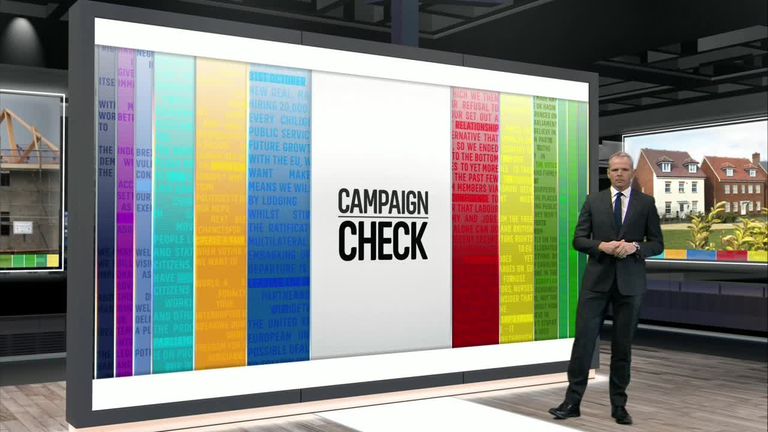Can the Greens achieve their radical goals on housing?
Tuesday 26 November 2019 18:16, UK
The Green Party has been decades ahead of its political rivals in warning of a climate crisis and in this election, the consensus appears to have caught up with them.
The Labour Party and the Liberal Democrats share their analysis that there is a climate emergency and Theresa May committed the Conservatives to "leading the world in tackling climate change".
But when it comes to tackling the problem the Greens remain decades ahead, two decades in fact.
The party's election manifesto commits the UK to becoming carbon neutral by 2030, a full 20 years ahead of the current government target of 2050.
Delivering such a fundamental change in a carbon-reliant economy in little more than a decade is hugely ambitious but the Greens maintain it is possible with public will and sufficient investment.
They propose 10 key pieces of legislation to deliver a "Green New Deal" backed by £1trn over 10 years, covering areas including energy, transport, industry and so on.
One key policy plank is housing and comes with specific targets to transform the energy efficiency of the nation's homes.
It matters because heating and lighting for homes contributes 14% of the UK's carbon emissions.
:: Listen to the Daily podcast on , , ,
That's more than double the 6% arising from energy we use in our homes to cook, boil the kettle, recharge smartphones and so on.
The Greens' proposal is to create 100,000 new council homes built to the highest standards of energy efficiency every year for a decade, at a cost of £10.6bn.
They also plan to retrofit insulation and green energy into one million more existing homes and premises annually, at an estimated cost of £24.6m.
Meeting these targets would require a vast increase in the quantity of council house building and domestic engineering.
Annual council house construction has been in steep decline for nearly 30 years, falling from almost 60,000 in the mid-1990s to just 7,000 additional new or acquired council homes last year.
Increasing that rate to 100,000 a year is a huge ask.
And just 7,000 were built in England last year
Upgrading existing housing to the highest energy efficiency standards may be an even bigger challenge, however.
Britain's homes are hugely energy inefficient, in part because of their age.
Judged against the energy performance register introduced as part of home information packs, less than one percent have the highest A or B rating.
And the Greens are proposing new builds and retro-fits meet an even higher standard, known as a Passivhaus, of which there are just 1,000 in the UK in total.
"To do this would be unprecedented," said Luke Murphy of the Institute for Public Policy Research, a think-tank.
"The current government has committed to upgrading 2.5 million homes for those in fuel poverty just to energy rating C, which isn't the highest rating, and they're on schedule to deliver that by 2091 rather than 2030, so this is extremely challenging, it's very ambitious."
Perhaps the major question is whether the construction industry has the skills or capacity to deliver, even if the money is there to pay for it.
Rick Hartwig, built environment lead for the Institution of Engineering and Technology, says the figures are realistic, but it could take a decade for the industry be ready to build at such a rate, about the same time the Green's carbon neutral target is due to be delivered.
"£24.6bn is more than enough to kick-start the industry to deliver deep retrofit.
"Current spending on energy measures is £640m per year on low performance single measures such as replacing the boiler or fitting new and improved windows and doors.
"We have called for the adoption of deep retrofit to reduce carbon generation of buildings to zero.
"This would be achieved by adding insulation to walls and roofs, adding PV panels, new windows and improved ventilation system.
"But it is difficult to see how the industry could move to high-performance net-zero measures at £24.6bn a year.
"That might take 10 years in itself to achieve."
Campaign Check scrutinises election claims made by political parties, examining if they are true or false, and the context. Sky News is working with Full Fact - the leading independent fact-checking charity.
The Brexit Election on Sky News - the fastest results and in-depth analysis on mobile, TV and radio.
- Watch Dermot Murnaghan live from 9pm on 12 December
- See the exit poll at 10pm
- Watch KayBurley@Breakfast election special on 13 December
- Find out what happens next in All Out Politics special from 9am with Adam Boulton








